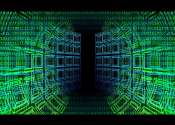Chess engine sacrifices mastery to mimic human play
When it comes to chess, computers seem to have nothing left to prove.
Jan 26, 2021
0
99
Computer Sciences

When it comes to chess, computers seem to have nothing left to prove.
Jan 26, 2021
0
99
Computer Sciences

A team of researchers at Colorado State University has designed an AI system to train a dog to obey certain oral commands without human assistance. In their paper uploaded to the arXiv preprint server, the researchers describe ...
Computer Sciences

From a pair of simple principles of evolution—chance mutation and natural selection—nature has constructed an almost unfathomable richness of life around us. Despite our scientific sophistication, human design and engineering ...
Jan 19, 2021
0
45
Security

Florida officials acknowledged Friday that state servers appear to have been compromised by overseas hackers who gained entry by imbedding malicious code into networking software from a Texas-based software company, SolarWinds.
Dec 19, 2020
0
9
Robotics

Jeffrey C. Trinkle has always had a keen interest in robot hands. And, though it may be a long way off, Trinkle, who has studied robotics for more than thirty years, says he's most compelled by the prospect of robots performing ...
Dec 14, 2020
1
98
Engineering

A new study has found one of the challenges in designing systems that involve people interacting with technology is to tackle the human trait of overconfidence.
Dec 9, 2020
0
8
Computer Sciences

Autonomous systems are affecting virtually all aspects of society, so future designs must be guided by a broad range of societal stakeholders. That's according to a new report led by scientists in the Oden Institute for Computational ...
Dec 2, 2020
0
11
Security

A small group of economists from Italy, the U.K., and the U.S. has published a Policy Forum piece in the journal Science suggesting that consumers need to be protected from collusive price setting by AI systems. They also ...
Security

Manchester United has been unable to fully restore its computer systems a week after being targeted in a cyberattack.
Nov 27, 2020
0
5
Security

Tired of Siri or Google Assistant draining your phone battery?
Nov 13, 2020
0
41
A computer is a machine that manipulates data according to a set of instructions.
Although mechanical examples of computers have existed through much of recorded human history, the first electronic computers were developed in the mid-20th century (1940–1945). These were the size of a large room, consuming as much power as several hundred modern personal computers (PCs). Modern computers based on integrated circuits are millions to billions of times more capable than the early machines, and occupy a fraction of the space. Simple computers are small enough to fit into a wristwatch, and can be powered by a watch battery. Personal computers in their various forms are icons of the Information Age and are what most people think of as "computers". The embedded computers found in many devices from MP3 players to fighter aircraft and from toys to industrial robots are however the most numerous.
The ability to store and execute lists of instructions called programs makes computers extremely versatile, distinguishing them from calculators. The Church–Turing thesis is a mathematical statement of this versatility: any computer with a certain minimum capability is, in principle, capable of performing the same tasks that any other computer can perform. Therefore computers ranging from a mobile phone to a supercomputer are all able to perform the same computational tasks, given enough time and storage capacity.
This text uses material from Wikipedia, licensed under CC BY-SA